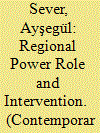| Srl | Item |
| 1 |
ID:
152607


|
|
|
|
|
| Summary/Abstract |
The aim of this article is to address the impact of the Baghdad Pact and the Anglo-American defense system and its collapse on the Turkish–Israeli relationship from 1954 to 1958, a discussion that is absent from scholarly studies. The article will highlight the different approaches and views of the two parties and their impact on the cold war alliances and the Arab–Israeli conflict. Examining this from the perspectives of both Ankara and Jerusalem will contribute to a comprehensive study of the bilateral relations during the 1950s. Some of the main questions to be addressed are: to what extent, if at all, did the Baghdad Pact change bilateral relations between Turkey and Israel? What were Israel's main concerns? Were its suspicions of Turkey's changing policy founded? How much was Turkey influenced by Iraq's membership of the Pact and its hostile attitude toward Israel? Was Turkey's attempt to maintain reasonable relations with both Israel and Iraq a realistic aim? All these will be assessed against regional upheavals and the cold war politics with current implications.
|
|
|
|
|
|
|
|
|
|
|
|
|
|
|
|
| 2 |
ID:
174372


|
|
|
|
|
| Summary/Abstract |
The article elaborates how Turkey’s relations with Syria, which have been pursued by varying foreign policy instruments and conduct, have greatly affected Turkey’s standing on the Middle East during the 2000s. By employing the relevant concepts, “regional power” and “third party intervention” in the literature, the article aims to explain the changes caused by the Syrian conflict in the AKP’s (Adalet ve Kalkınma Partisi—the Justice and Development Party) foreign policy in a better frame. After the Syrian conflict, Turkey’s increasing intervention in Syria including use of force resulted in a new power projection other than soft power in its regional relations. Neighboring a civil war state caused Ankara to organize its relations with Syria and the Middle East in a new context which requires new mechanisms, new partnerships, and new interpretations in the face of rising nongovernmental armed groups, refugee flows, changing regional alignments, and diverging interests with its major Western allies.
|
|
|
|
|
|
|
|
|
|
|
|
|
|
|
|